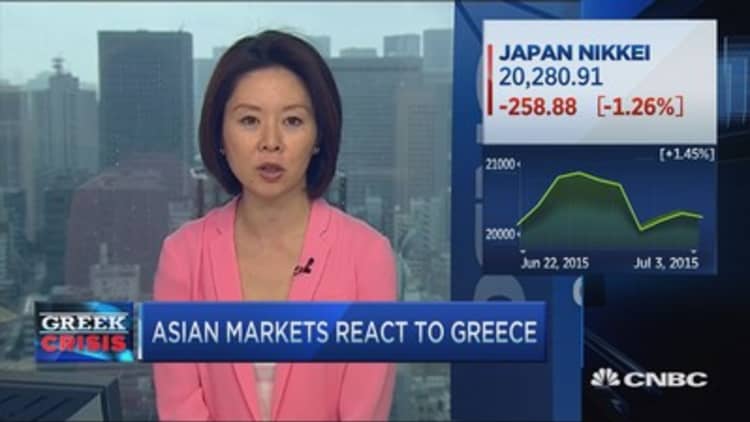The shock results from Greece's referendum on Sunday sent markets into a tailspin during Asian trade on Monday, with U.S. crude suffering the biggest declines, but analysts seemed relieved that the impact wasn't worse.
"I am going to be the first to put my hand up and say I expected a much more aggressive reaction to a 'no' vote. It has to be said that despite markets adopting a definitive risk-aversion feel, the mood has felt quite calm and there is little panic. It's almost as if Asia-based traders are waiting for confirmation on trading moves from European traders before positioning short-term portfolios," said Chris Weston, chief market strategist at IG, in a note.
The surprise resignation of Greek finance minister Yanis Varoufakis and rising bets on a 'Grexit' will likely keep sentiment shaky, despite Athens denying that the 'no' vote could lead to an exit from the euro zone.
The increased probability of a 'Grexit' has moved above 50 percent for the first time and that could see a risk-off mood prevail, according to ING. Meanwhile, Wolfgang Piccoli, managing director at Teneo Intelligence, told CNBC that the likelihood of a 'Grexit' now stands at 75 percent, from 15 percent previously.
Follow all the latest action in our market wrap below.
Stocks
The Shanghai Composite surged 7.8 percent at the open but pared gains to close 2.4 percent higher in a volatile session following Beijing's latest round of market-boosting measures. Over the weekend, several brokerages committed $19 billion collectively to buying shares while 28 firms suspended plans for initial public offerings. In recent weeks, policymakers enacted a raft of actions, including a loosening of margin lending rules and a fourth interest rate cut in six months, to halt the benchmark's 30 percent crash in the past month.
Meanwhile, Hong Kong's Hang Seng Index reversed early gains and tumbled as much as 4.5 percent, leading losses in Asia, as deepening fears over Greece overshadowed optimism over Shanghai's rebound.
The Nikkei dropped 2 percent, weighed down by exporters and major banks, even as Bank of Japan (BoJ) Governor Kuroda pledged to take action against volatile trade. Early Monday, Kuroda said discussions were held with the government to ensure a smooth market response but didn't specify what kind of action the bank could take.
In Australia, sharp losses in heavyweight mining stocks like BHP Billiton and Fortescue Metals dragged the benchmark 1 percent lower. Experts pointed to China as a more influential factor than Greece, seeing as the world's second largest economy is Canberra's primary trading partner.
Commodities
Nymex crude suffered a 4 percent loss at $54.44 a barrel while Brent crude traded down 1 percent to $59.35 a barrel. Worsening the bearish mood was data last week showing that U.S. drilling rose for the first time after 29 weeks of declines, Reuters reported.
"Despite the bearish oil prices, we continue to believe that this bearishness should be only for the short run. Provided the decision for Iranian crude ends with only a slow flow into the markets, prices should correct upwards in the longer run. As for the WTI-Brent spread, we expect some narrowing this week when the US crude inventories drops. Last week's drop should be an anomaly and should correct this week on strong seasonal demand," said analysts at Phillip Futures in a note.
Demand for safe-haven gold fizzled out by the afternoon session, with the precious metal trading flat in negative territory after jumping as much as 0.6 percent earlier.
Industrial metals fell across the board. Copper, widely regarded as a key indicator of economic trends, slumped 2 percent to a three-month low on the London Metal Exchange. Meanwhile, aluminum, lead and zinc were all 1 percent lower.

Currencies
The euro was at the heart of currency market spikes, dropping as much as 1 percent against both the yen and dollar, but managed to move off session lows. It touched a six-week trough at 133.67 yen as the safe-haven currency rallied and briefly hit $1.0967 against the greenback—near a one-month low of $1.0955 hit last week.
The Australian dollar hit a six-year low at $0.7448 before trimming losses. Analysts believe the currency could head even lower on the prospect of a looming rate cut from the Reserve Bank of Australia (RBA).
"The treat of competitive easing looks likely to continue. With the PBoC cutting lending rates the previous weekend, the RBA may in turn be persuaded to follow suit. Together with RBNZ's move in early June, RBA governor may be forced to move again on Tuesday- against the market's expectations," said Nicholas Teo, market analyst at CMC Markets.
Amid safe havens, the yen rose as high as 121.72 per dollar while the Swiss franc firmed 0.4 percent.
The dropped nearly 1 percent as the euro's slide added to fears over domestic political instability. A Wall Street Journal report last week noted that $700 million from troubled state fund 1MDB was deposited into Prime Minister Najib Razak's personal bank account.

